As was foretold, we've added advertisements to the forums! If you have questions, or if you encounter any bugs, please visit this thread: https://forums.penny-arcade.com/discussion/240191/forum-advertisement-faq-and-reports-thread/
Options
[SCOTUS] Now 2014 Compatible [Read the OP] - In a 5-4 Opinion, Worst Court
Mill Registered User regular
Registered User regular
 Registered User regular
Registered User regular
I'm pretty sure most here know what the US Supreme Court is and a reasonable understanding of how it works. For those that don't or wish to refresh their knowledge on the US Supreme Court. This wiki article does a decent job of covering the basics of how the court works and this wiki article does a decent job of covering how the court is filled.
As a side note, given that the Supreme Court is the highest court in the land and that both the President and US Senate influence who serves on the court. This makes voting in Presidential and Senate elections rather important for everyone. This also indirectly makes elections for other offices below Senate and Presidential races important since lower races tend to generate the roster for future candidates for higher offices. Granted voting is important period, but the above is what's pertinent to the topic of this thread.
The Roberts Court: This court is considered more conservative than it's predecessor. Roberts, Alito, Scalia, Thomas and Kennedy are considered the five conservatives of the court. With Kagan, Sotomayor, Breyer and Ginsburg being the court's liberals. Kennedy tends to be a swing vote for this court; however, Roberts has been the critical vote in at least one ruling thus far (ACA for those that currently don't know). The Roberts Court has also been criticized for being too divided on the issues and has issues a number of 5 to 4 rulings.
http://www.supremecourt.gov is a good sources to see what is on the Court's docket and to read up on opinions.
(When I get time, I'll try to put a list of potential major decisions here. I'm open to suggestions BTW)
Expectations for this thread
1. This is not the general politics or lol this party sucks thread.
2. This is a thread about the US Supreme Court, if it doesn't have anything to do with SCOTUS, it doesn't belong here.
3. Not all things about SCOTUS belong here. Some cases dealing with certain issues, already have a thread or their own god damn separate thread that is more appropriate to discuss a certain SCOTUS rulings or cases. List of current topics that may be coming before the Court that are better served by another thread (I'll try to keep this updated and include links to the relevant threads:
5. In the event that we get a SCOTUS vacancy in the lifetime of this thread, this would probably be the best place to discuss such an appointment given how low traffic this thread is likely to be.
6. Stuff regarding 2014 starts here.
Old OP for prosperity, but mostly so that people responding to it don't look insane. :P
As a side note, given that the Supreme Court is the highest court in the land and that both the President and US Senate influence who serves on the court. This makes voting in Presidential and Senate elections rather important for everyone. This also indirectly makes elections for other offices below Senate and Presidential races important since lower races tend to generate the roster for future candidates for higher offices. Granted voting is important period, but the above is what's pertinent to the topic of this thread.
The Current Justices
Biographies and photos copied from http://www.supremecourt.gov/about/biographies.aspx.
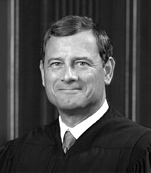
John G. Roberts, Jr., Chief Justice of the United States,
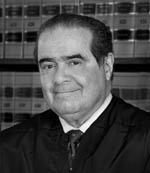
Antonin Scalia, Associate Justice,
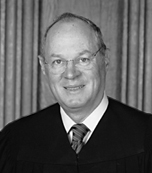
Anthony M. Kennedy, Associate Justice,

Clarence Thomas, Associate Justice,
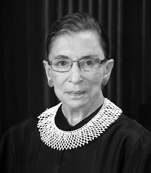
Ruth Bader Ginsburg, Associate Justice,
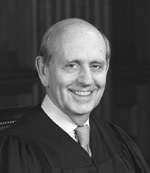
Stephen G. Breyer, Associate Justice,
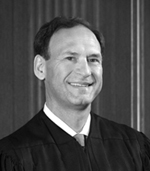
Samuel Anthony Alito, Jr., Associate Justice,
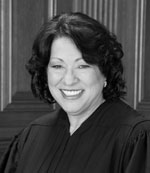
Sonia Sotomayor, Associate Justice,

Elena Kagan, Associate Justice,
Biographies and photos copied from http://www.supremecourt.gov/about/biographies.aspx.

John G. Roberts, Jr., Chief Justice of the United States,
was born in Buffalo, New York, January 27, 1955. He married Jane Marie Sullivan in 1996 and they have two children - Josephine and John. He received an A.B. from Harvard College in 1976 and a J.D. from Harvard Law School in 1979. He served as a law clerk for Judge Henry J. Friendly of the United States Court of Appeals for the Second Circuit from 1979–1980 and as a law clerk for then-Associate Justice William H. Rehnquist of the Supreme Court of the United States during the 1980 Term. He was Special Assistant to the Attorney General, U.S. Department of Justice from 1981–1982, Associate Counsel to President Ronald Reagan, White House Counsel’s Office from 1982–1986, and Principal Deputy Solicitor General, U.S. Department of Justice from 1989–1993. From 1986–1989 and 1993–2003, he practiced law in Washington, D.C. He was appointed to the United States Court of Appeals for the District of Columbia Circuit in 2003. President George W. Bush nominated him as Chief Justice of the United States, and he took his seat September 29, 2005.

Antonin Scalia, Associate Justice,
was born in Trenton, New Jersey, March 11, 1936. He married Maureen McCarthy and has nine children - Ann Forrest, Eugene, John Francis, Catherine Elisabeth, Mary Clare, Paul David, Matthew, Christopher James, and Margaret Jane. He received his A.B. from Georgetown University and the University of Fribourg, Switzerland, and his LL.B. from Harvard Law School, and was a Sheldon Fellow of Harvard University from 1960–1961. He was in private practice in Cleveland, Ohio from 1961–1967, a Professor of Law at the University of Virginia from 1967–1971, and a Professor of Law at the University of Chicago from 1977–1982, and a Visiting Professor of Law at Georgetown University and Stanford University. He was chairman of the American Bar Association’s Section of Administrative Law, 1981–1982, and its Conference of Section Chairmen, 1982–1983. He served the federal government as General Counsel of the Office of Telecommunications Policy from 1971–1972, Chairman of the Administrative Conference of the United States from 1972–1974, and Assistant Attorney General for the Office of Legal Counsel from 1974–1977. He was appointed Judge of the United States Court of Appeals for the District of Columbia Circuit in 1982. President Reagan nominated him as an Associate Justice of the Supreme Court, and he took his seat September 26, 1986.

Anthony M. Kennedy, Associate Justice,
was born in Sacramento, California, July 23, 1936. He married Mary Davis and has three children. He received his B.A. from Stanford University and the London School of Economics, and his LL.B. from Harvard Law School. He was in private practice in San Francisco, California from 1961–1963, as well as in Sacramento, California from 1963–1975. From 1965 to 1988, he was a Professor of Constitutional Law at the McGeorge School of Law, University of the Pacific. He has served in numerous positions during his career, including a member of the California Army National Guard in 1961, the board of the Federal Judicial Center from 1987–1988, and two committees of the Judicial Conference of the United States: the Advisory Panel on Financial Disclosure Reports and Judicial Activities, subsequently renamed the Advisory Committee on Codes of Conduct, from 1979–1987, and the Committee on Pacific Territories from 1979–1990, which he chaired from 1982–1990. He was appointed to the United States Court of Appeals for the Ninth Circuit in 1975. President Reagan nominated him as an Associate Justice of the Supreme Court, and he took his seat February 18, 1988.

Clarence Thomas, Associate Justice,
was born in the Pin Point community of Georgia near Savannah June 23, 1948. He married Virginia Lamp in 1987 and has one child, Jamal Adeen, by a previous marriage. He attended Conception Seminary and received an A.B., cum laude, from Holy Cross College, and a J.D. from Yale Law School in 1974. He was admitted to law practice in Missouri in 1974, and served as an Assistant Attorney General of Missouri from 1974–1977, an attorney with the Monsanto Company from 1977–1979, and Legislative Assistant to Senator John Danforth from 1979–1981. From 1981–1982, he served as Assistant Secretary for Civil Rights, U.S. Department of Education, and as Chairman of the U.S. Equal Employment Opportunity Commission from 1982–1990. He became a Judge of the United States Court of Appeals for the District of Columbia Circuit in 1990. President Bush nominated him as an Associate Justice of the Supreme Court, and he took his seat October 23, 1991.

Ruth Bader Ginsburg, Associate Justice,
was born in Brooklyn, New York, March 15, 1933. She married Martin D. Ginsburg in 1954, and has a daughter, Jane, and a son, James. She received her B.A. from Cornell University, attended Harvard Law School, and received her LL.B. from Columbia Law School. She served as a law clerk to the Honorable Edmund L. Palmieri, Judge of the United States District Court for the Southern District of New York, from 1959–1961. From 1961–1963, she was a research associate and then associate director of the Columbia Law School Project on International Procedure. She was a Professor of Law at Rutgers University School of Law from 1963–1972, and Columbia Law School from 1972–1980, and a fellow at the Center for Advanced Study in the Behavioral Sciences in Stanford, California from 1977–1978. In 1971, she was instrumental in launching the Women’s Rights Project of the American Civil Liberties Union, and served as the ACLU’s General Counsel from 1973–1980, and on the National Board of Directors from 1974–1980. She was appointed a Judge of the United States Court of Appeals for the District of Columbia Circuit in 1980. President Clinton nominated her as an Associate Justice of the Supreme Court, and she took her seat August 10, 1993.

Stephen G. Breyer, Associate Justice,
was born in San Francisco, California, August 15, 1938. He married Joanna Hare in 1967, and has three children - Chloe, Nell, and Michael. He received an A.B. from Stanford University, a B.A. from Magdalen College, Oxford, and an LL.B. from Harvard Law School. He served as a law clerk to Justice Arthur Goldberg of the Supreme Court of the United States during the 1964 Term, as a Special Assistant to the Assistant U.S. Attorney General for Antitrust, 1965–1967, as an Assistant Special Prosecutor of the Watergate Special Prosecution Force, 1973, as Special Counsel of the U.S. Senate Judiciary Committee, 1974–1975, and as Chief Counsel of the committee, 1979–1980. He was an Assistant Professor, Professor of Law, and Lecturer at Harvard Law School, 1967–1994, a Professor at the Harvard University Kennedy School of Government, 1977–1980, and a Visiting Professor at the College of Law, Sydney, Australia and at the University of Rome. From 1980–1990, he served as a Judge of the United States Court of Appeals for the First Circuit, and as its Chief Judge, 1990–1994. He also served as a member of the Judicial Conference of the United States, 1990–1994, and of the United States Sentencing Commission, 1985–1989. President Clinton nominated him as an Associate Justice of the Supreme Court, and he took his seat August 3, 1994.

Samuel Anthony Alito, Jr., Associate Justice,
was born in Trenton, New Jersey, April 1, 1950. He married Martha-Ann Bomgardner in 1985, and has two children - Philip and Laura. He served as a law clerk for Leonard I. Garth of the United States Court of Appeals for the Third Circuit from 1976–1977. He was Assistant U.S. Attorney, District of New Jersey, 1977–1981, Assistant to the Solicitor General, U.S. Department of Justice, 1981–1985, Deputy Assistant Attorney General, U.S. Department of Justice, 1985–1987, and U.S. Attorney, District of New Jersey, 1987–1990. He was appointed to the United States Court of Appeals for the Third Circuit in 1990. President George W. Bush nominated him as an Associate Justice of the Supreme Court, and he took his seat January 31, 2006.

Sonia Sotomayor, Associate Justice,
was born in Bronx, New York, on June 25, 1954. She earned a B.A. in 1976 from Princeton University, graduating summa cum laude and receiving the university's highest academic honor. In 1979, she earned a J.D. from Yale Law School where she served as an editor of the Yale Law Journal. She served as Assistant District Attorney in the New York County District Attorney's Office from 1979–1984. She then litigated international commercial matters in New York City at Pavia & Harcourt, where she served as an associate and then partner from 1984–1992. In 1991, President George H.W. Bush nominated her to the U.S. District Court, Southern District of New York, and she served in that role from 1992–1998. She served as a judge on the United States Court of Appeals for the Second Circuit from 1998–2009. President Barack Obama nominated her as an Associate Justice of the Supreme Court on May 26, 2009, and she assumed this role August 8, 2009.

Elena Kagan, Associate Justice,
was born in New York, New York, on April 28, 1960. She received an A.B. from Princeton in 1981, an M. Phil. from Oxford in 1983, and a J.D. from Harvard Law School in 1986. She clerked for Judge Abner Mikva of the U.S. Court of Appeals for the D.C. Circuit from 1986-1987 and for Justice Thurgood Marshall of the U.S. Supreme Court during the 1987 Term. After briefly practicing law at a Washington, D.C. law firm, she became a law professor, first at the University of Chicago Law School and later at Harvard Law School. She also served for four years in the Clinton Administration, as Associate Counsel to the President and then as Deputy Assistant to the President for Domestic Policy. Between 2003 and 2009, she served as the Dean of Harvard Law School. In 2009, President Obama nominated her as the Solicitor General of the United States. After serving in that role for a year, the President nominated her as an Associate Justice of the Supreme Court on May 10, 2010. She took her seat on August 7, 2010.
The Roberts Court: This court is considered more conservative than it's predecessor. Roberts, Alito, Scalia, Thomas and Kennedy are considered the five conservatives of the court. With Kagan, Sotomayor, Breyer and Ginsburg being the court's liberals. Kennedy tends to be a swing vote for this court; however, Roberts has been the critical vote in at least one ruling thus far (ACA for those that currently don't know). The Roberts Court has also been criticized for being too divided on the issues and has issues a number of 5 to 4 rulings.
http://www.supremecourt.gov is a good sources to see what is on the Court's docket and to read up on opinions.
(When I get time, I'll try to put a list of potential major decisions here. I'm open to suggestions BTW)
Expectations for this thread
1. This is not the general politics or lol this party sucks thread.
2. This is a thread about the US Supreme Court, if it doesn't have anything to do with SCOTUS, it doesn't belong here.
3. Not all things about SCOTUS belong here. Some cases dealing with certain issues, already have a thread or their own god damn separate thread that is more appropriate to discuss a certain SCOTUS rulings or cases. List of current topics that may be coming before the Court that are better served by another thread (I'll try to keep this updated and include links to the relevant threads:
- Anything that has to do with Obamacare (ACA): The Religious Objections to contraception coverage comes to mind.
- Voting Rights
- Reproductive Rights, that don't deal specifically with things in ACA
- Gun Rights: Seriously, if we get a ruling deal with gun rights, it'll need it's own god damn separate thread since any tangent on them tends to dominate and derail any political thread they show up in.
5. In the event that we get a SCOTUS vacancy in the lifetime of this thread, this would probably be the best place to discuss such an appointment given how low traffic this thread is likely to be.
6. Stuff regarding 2014 starts here.
Old OP for prosperity, but mostly so that people responding to it don't look insane. :P
So I'm pretty sure we're all familiar with the shitty Citizens United ruling from 2010. On the off chance that someone stumbles onto this thread that has either lived under a fucking rock or managed to remain oblivious to this travesty of a ruling. Here is a brief summation. Five dumbasses on SCOTUS decided that it was unconstitutional to limit independent contributions from corporations and unions. Apparently they viewed money as speech and felt that the current campaign finance laws were just too mean to the wealthy by restricting their speech through money. This has led the creation of superPACs which turned out lots of obnoxious and terrible ads during the 2012 election. The only redeeming thing out of the whole well was Colbert's superPAC Americans for a Better Tomorrow, Tomorrow, which intention or not, highlighted just how absurd the whole thing is.
So you might be asking, WTF does that have to do with cases that are being heard before SCOTUS in the year 2013. Well Citizens United was only a blow that struck one the pillars of campaign finance regulations, the court is now taking up a case to consider the constitutionality of the other pillar dealing with political gifts. The ruling from that case could also end up being, as shitty as, Citizens United given how bad it would be for trying to keep corruption out of politics.
So the gist of this case is that an Alabama man named Shaun McCutcheon and the Republican National Committee feel that aggregate limits, their overall contributions to multiple candidate or committees, is too onerous. Pretty much they want to be able to donate money to an unlimited number of candidates and political committees.
Rght now the shitty billionaires and millionaires that want to fuck everyone over, who aren't wealth have to pick and choose which shitty ass republican candidates they try to help get elected. In the case of McCutcheon, he was only able to contribute money to 16 federal candidates in recent elections and there were another 12 that he wanted to support but he had capped his contributions. So without the limits, McCutcheon would have been donating money to at least 28 different federal candidates. I'm pretty sure no sane person wants to live in a country were Joe Regressive Ass Bigot Billionaire and his buddies can bankroll every republican candidate that is running at the federal level. I'd argue that our current caps are probably too generous given that McCutcheon was able to donate to 16 different federal candidates.
Now given that our current court gave us the shitty, shitty decision known as Citizens United, I'm worried that by taking this case up, they give us another terrible ruling that allows the rich more leverage to fuck over everyone. I'm not optimistic that we'll see SCOTUS tell these people to fuck off because money tends to be corrupting and there is too much of it in politics.
Here's the link to where I first heard about this case.
BTW I'm not opposed to turning this thread into a discussion on other cases being brought before SCOTUS. I'll just ask that if there is a thread pertaining to the topic of what a case is covering (for example gun control), that only the case gets mentioned and that actually discussion of the case be moved to the relevant thread. I didn't see a SCOTUS thread before posting this and I tried the search function (let's not talk about how that went).
So you might be asking, WTF does that have to do with cases that are being heard before SCOTUS in the year 2013. Well Citizens United was only a blow that struck one the pillars of campaign finance regulations, the court is now taking up a case to consider the constitutionality of the other pillar dealing with political gifts. The ruling from that case could also end up being, as shitty as, Citizens United given how bad it would be for trying to keep corruption out of politics.
So the gist of this case is that an Alabama man named Shaun McCutcheon and the Republican National Committee feel that aggregate limits, their overall contributions to multiple candidate or committees, is too onerous. Pretty much they want to be able to donate money to an unlimited number of candidates and political committees.
Rght now the shitty billionaires and millionaires that want to fuck everyone over, who aren't wealth have to pick and choose which shitty ass republican candidates they try to help get elected. In the case of McCutcheon, he was only able to contribute money to 16 federal candidates in recent elections and there were another 12 that he wanted to support but he had capped his contributions. So without the limits, McCutcheon would have been donating money to at least 28 different federal candidates. I'm pretty sure no sane person wants to live in a country were Joe Regressive Ass Bigot Billionaire and his buddies can bankroll every republican candidate that is running at the federal level. I'd argue that our current caps are probably too generous given that McCutcheon was able to donate to 16 different federal candidates.
Now given that our current court gave us the shitty, shitty decision known as Citizens United, I'm worried that by taking this case up, they give us another terrible ruling that allows the rich more leverage to fuck over everyone. I'm not optimistic that we'll see SCOTUS tell these people to fuck off because money tends to be corrupting and there is too much of it in politics.
Here's the link to where I first heard about this case.
BTW I'm not opposed to turning this thread into a discussion on other cases being brought before SCOTUS. I'll just ask that if there is a thread pertaining to the topic of what a case is covering (for example gun control), that only the case gets mentioned and that actually discussion of the case be moved to the relevant thread. I didn't see a SCOTUS thread before posting this and I tried the search function (let's not talk about how that went).
Mill on
0
This discussion has been closed.
Posts
I am interested to see what the court will potentially do with the two lines of ACA challenges currently in the circuit courts (challenges to the ability of people on federal exchanges to get premium tax credits, and the free birth control mandate). The latter is getting more press, but the former is much more important, as a ruling that people cannot get credits if their state has a federal exchange would eliminate the employer penalty in those states, and neuter the law.
Well, everyone pointed out in the last election that although the GOP SuperPACs had absolute gobs of money, since they weren't allowed to coordinate directly with the campaign (wink wink, nudge nudge) they were mostly limited to running TV ads. The payback on the ads was incredibly low, and arguably counterproductive. The SuperPACs also couldn't coordinate their message with the candidates, and they couldn't really contribute to the ground game. In a lot of places, the SuperPACs might as well have been throwing stacks of money into a furnace.
I'll assume that once we get another 5-4 decision allowing contributions to an unlimited number of Federal candidates, the next major case we will see (using precedent from CU and this case) will be yet another 5-4 decision removing any and all caps on funding for individual candidates...and then a final case that allows corporations and unions to contribute an unlimited amount directly to an unlimited number of campaigns.
I see this case (and the ones above) as an inevitable follow-up to CU, and a path down the slippery slope to corporations just outright sponsoring candidates. Sadly, with the precedent of CU, and a 5-4 split with the majority being GOP hacks, I see the above case as virtually inevitable. Hopefully we can get CU overturned and / or some real campaign finance reform soon.
"Hey. Hey assholes. Stuffing grubby wads of cash into a political candidates pocket isn't "speech"."
I'd word it something like:
"Congress shall agree upon a sum of money that each candidate for Federal office such as Senator, Congressman or President can use to campaign for election. It shall be unlawful for candidates or any other person to use any other resources to affect the outcome of an election, referendum or any other free vote."
Dunno how constitutionally kosher that is, but I'm not a lawyer. I also know it's unlikely this would ever get ratified, but a guy can dream.
Oi, Money Talks.
I got a little excited when I saw your ship.
Part of the point of an amendment is that congress sucks at this kind of thing. We'd see the "Love Puppies and Kitten Patriot Apple Pie Act" that incidentally raised that number to a hojillion dollars.
No, but you might consider giving it to their spouse.
It may surprise you that the issue is not WHO is spending the money, but rather HOW MUCH money is being spent.
A billion dollars spent to get a job that only pays 250k a year?
Sumfinks erff thar.
I'm almost at the level where i think contributions to officials not in your state or district should be illegal. CU failed on the federal level we all know that. but on the state level it's bought and sold entire legislatures in Michigan and Ohio which turned around and engaged in absurd anti-worker legislation. Those people were elected mostly with out of state money.
I'd agree with you for state legislators. Anyone running for federal offices in my book shouldn't be under that rule.
Why? Congressmen represent a specific 700k people just as much as state legislators do.
Then we get into the fun question of what district "McDonalds" or "Walmart" are in.
I'm not arguing against limits on corporate donations. I argue for state legislators to be under that rule and not federal congressmen for a simple reason.
No one ever pays attention to state legislator races. Ever. And in certain years (2010), those can have very long lasting implications. At least for House races there's some semblance of watching since it's 1/435 in the part of Congress that gets to do monetary policy.
This sounds like your trying to treat a fever by turning the AC up. They're not really related and in the end trying to treat a symptom isn't going to fix anything.
Actual public financing would take care of the money bombing small races.
Look, I'm not trying to influence an election. I'm just running an ad about how you'll burn in eternal hellfire for supporting abortion. I didn't mention which candidates love to murder babies, but it begins with D and rhymes with emocrats.
I think this is the right decision. Why wouldn't a trained drug sniffing dog's alert that there may be drugs in a car be probable cause for a search, particularly where, as here, the officer was already suspicious based on the driver's behavior? To be clear, the alternative is to overturn a case where a meth addict who cooks meth was caught with supplies to cook meth, and where the dog accurately detected it, based on a lack of a sufficient pedigree for the dog, who was in fact correct?
Almost like it was alerting based on something other than the presence of drugs.
Oh, SKFM. Carry on.
Because, as we have discussed, drug dogs have a serious Clever Hans problem. Which should be enough to question the ability of drug dogs to generate probable cause.
Where do you see that? I don't see it in the link.
The other case on the home search is also interesting, but I hope they come out the same way. You have reason to suspect drugs, then on top of that you have a positive from a drug sniffing dog and that gives you probable cause. Seems reasonable to me. If a source calls to say "this guy is growing weed in his house" and then a dog gives a positive, that seems pretty solid to me.
It's not a mistake that the two major process stories that emerged after the election were Republican volunteers flipping out about how terrible their field program was and David Axelrod telling people that the main reason he was never worried was that OFA's tracking poll was bigger and better than most of the independent tracking polls. Those are the two areas where we paid more.
I see this case as an extension of the GOP's nation-wide effort where their response to getting beat like a drum is simply to change the rules. Multiple states have considered shifting their elector distribution to a Congressional District basis instead of a statewide popular vote basis, many states are continuing to look to reduce the number of forms of acceptable identification for use at the ballots (fucking brown people, man, who knew they received utilities bills?!), and once again they're revisiting the question of how they can game what they see as a natural financial advantage.
I'm not quite as doom-and-gloom about the consequences of a decision in the GOP's favor on this case as some may be. Campaign finance law is not their fundamental problem; no amount of campaign spending will overcome the fact that you can't win a national election by catering exclusively to old white men.
If we are going to treat them as a tool that police officers use instead of police officers, they should be held to the same standard as any other tools (such as IR imaging, established in Kyllo v. United States) which require a warrant for use.
Instead, they are given the benefits of both positions, with none of the restrictions or responsibilities.
I'd go so far as to say each police dog should require regular 're-certification / re-training' to make sure they are properly detecting drugs, and any time a police dog generates a false positive it's subject to review and investigation. Any search based on a police dog's that's not current in their certification / training would be thrown out.
But hell, I don't control these things or the people who do.
What if the dog has been trained to detect both drugs and upper middle class jews? Still OK?
Fact: drug dogs aren't reliable.
That should have been the beginning and the end of the case.
the "no true scotch man" fallacy.
Than I guess we'd finally have an answer to the "Is SKFM middle class" debate.
This is consequentialist Ends Justify Means thinking.
Which is bad.
v bad.
I'd just like to add one thing here. These cases, and your 4th Amendment rights, depend on criminals, because nobody else can bring a case - you need to have some kind of remedy that you're demanding, like "don't throw me in jail". So the fact that your victim is unsavory, or actually guilty, is not relevant - innocents are filtered out and this is what you're left with.
And the results they generate are reliant on what their handlers want. Drug dogs problem is like the counting horse. They don't care about the drugs they care about making their handler happy. So you could argue that what the cops want is going to influence how the dog reacts.
I disagree. This ruling does not give carte blanche to the police to use dogs in place of warrants in all cases. But if you are in a situation where the police officer has reason to suspect drugs, and the dog confirms it, then I would much rather have that search be upheld, especially since the risk of false positives is just the inconvenience of having your car searched, where as the risk of throwing out the search is letting people we in fact know have committed a crime go free. I understand the need to enforce the procedure to protect the innocent, but I just don't think that this case is undermining the process, and as a general matter, I am in favor of rulings that minimize the number of cases where criminals walk free based on evidence that was discovered through reasonable actions by the police (and this case explicitly requires that the action be reasonable) being thrown out.
If money is speech, and restrictions on money are equivalent of restrictions on speech,
Then isn't lack of access to money a restriction of speech?
"You can be yodeling bear without spending a dime if you get lucky." -> reVerse
"In the grim darkness of the future, we will all be nurses catering to the whims of terrible old people." -> Hacksaw
"In fact, our whole society will be oriented around caring for one very decrepit, very old man on total life support." -> SKFM
I mean, the first time I met a non-white person was when this Vietnamese kid tried to break my legs but that was entirely fair because he was a centreback, not because he was a subhuman beast in some zoo ->yotes
A situation in which the handler has an existing expectation of the animal's behavior is exactly the Clever Hans problem space.
The police officer's suspicion makes the drug dog less reliable, not more.
the "no true scotch man" fallacy.
Aren't they all incorporated in Delaware for the taxes?
If dogs give false positives then evidence from that shouldn't be admissible. Lie detector tests aren't admissible for this very reason.
Lie detectors are not admissible as evidence. Noone is saying that the dog's sniff be admitted as evidence. Just that it be able to form part of the probable cause needed to search, and that the evidence discovered by this search be admissible.